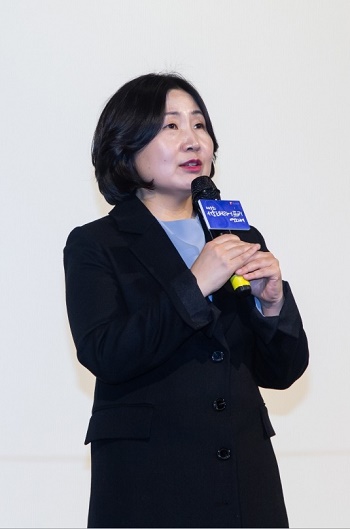
Kim Soo-jeong is the CEO of Korean Barrier-Free Films Committee (KOBAFF), a nonprofit organization that produces, screens, and distributes barrier-free films. Barrier-free films consist of audio descriptions and subtitles in reference to narration, dialogue, sound effects, and background music. KOBAFF works to develop barrier-free film culture and guarantee the enjoyment of the visually impaired and the hearing-impaired, the elderly, and multicultural families.
“When I was studying Science Education at Ewha, I always felt trapped inside my major, not being able to experience other extracurricular activities,” Kim said. “However, deep inside, I have always had an inexplicable yearning towards the cultural industry, which I might say is the ‘affinity of the soul’.”
Kim commented that an important motivational factor in setting up the business was the compassion for the social underdogs.
“The moment I knew that some people in the world couldn’t see movies that I could even die for, I felt heartbroken,” Kim noted. “Even if I explain every detail to them, they can never be moved sincerely unless they watched the film themselves. Thus I was delighted to undertake the reproduction for people in various circumstances.”
When asked about the toughest part of the reproduction, Kim replied that raising the production costs was realistically the sharp end of the business. Persuading the copyright holders and the sponsors was also a highly intricate process. Even though one has a strong will to reproduce a specific film, if things go wrong, the plan has to be relinquished. Nevertheless, Kim firmly stated that it was worth the effort.
“The greatest merit of this work is, that you can provide valuable experience to those who cannot feel the film,” Kim remarked.
KOBAFF made a public announcement on April 27 about the reproduction of an animation film ‘Missing Link.’ The film has been awarded the 2020 Golden Globe Award for Best Animated Feature Film, and also received a nomination at the 92nd Academy Awards for Best Animated Feature. A factor that came into spotlight was that it marked a new phase in the evolution of stop-motion animation studios with the smallest articulated puppets and the largest hero puppets.
“The employees in KOBAFF and I really wanted to reproduce the film ‘Missing Link’, because it was quite an adventure for all of us,” Kim said. “We were all convinced that it was the kind of film that could help children imagine something out of the ordinary. Also, reproducing a stop-motion film is quite rare, so we thought it was worth a try. There is a tendency to look at stop-motion with this nostalgic perspective, which is a novelty that shouldn’t move anywhere.”
Kim advised that when reproducing, it was vital to take account of the audience. Since animation films are viewed mostly by children who are slower in reading captions than adults, the captions should contain fewer words, easier sentences, and bigger letters.
With growing concern over the COVID-19 crisis in the film industry, Kim noted the committee will carry on the work as best as they can, despite the limits.
“Barrier-free films are usually screened off-cinema in groups, and since the reproduction is based on the recording, masks are not allowed,” Kim explained. “Moreover, we have been conducting the ‘Seoul Barrier-Free Film Festival (SeBaFF) since 2011 under the slogan of ‘a film festival that everyone can enjoy regardless of disabilities,’ which brings about a challenging situation for my workers. Yet we decided to look upon this circumstance as an experience. It definitely is a heavy burden for all of us, but we will not give up.”
Kim concluded with an advice to the youth planning for startups.
“I hope youth convert their ideas into action only when they are fully ready. Making a fortune is good, but supporting the community with the goal of improving the quality of life should be emphasized first.”

